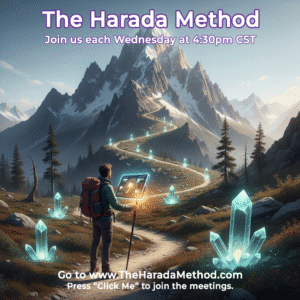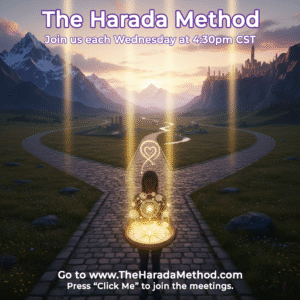What is the Harada Method ? Join our Free Harada Method Meetings and find out!
15 Free Harada Method Meetings:
A Journey of Mastery and Self-Reliance
In 2008, a high‑school baseball player named Shohei Ohtani sat down with his coach and filled out a document that would change the course of his life — the Harada Method goal sheet. On that paper, a 17‑year‑old student wrote his audacious dream:
“I will become the best player in the world.”

That single act of defining a clear purpose, setting measurable goals, and planning every step to reach them is the essence of the Harada Method, a personal mastery system created by Takashi Harada — one of Japan’s most successful educators.
Ohtani didn’t wait for opportunity. He built the foundation of his success daily, through disciplined reflection, preparation, and relentless consistency. Every practice, every behavior, and every detail was guided by his vision of excellence — the same process that today inspires leaders, coaches, and individuals worldwide through
Harada Coaches Worldwide.
The Harada Method isn’t only for athletes; it’s for anyone committed to becoming their best self through self‑reliance and continuous improvement. It’s a roadmap to mastery — built on 15 interconnected principles that mirror Ohtani’s journey, and the path each of us can follow toward greatness.















1. Self‑Reliance
Ohtani’s journey began with the decision to depend on himself. He learned that true success doesn’t come from others’ direction — it comes from personal ownership. In the Harada Method, this is the foundation: you are your own coach, your own motivator, your own leader.
2. Purpose
He defined why he wanted to be the best. Purpose gave meaning to every practice and choice. When you know your why, your daily actions align naturally with your long‑term mission.
3. Goals
Ohtani broke his vision into achievable, measurable targets — pitching speed, batting performance, physical conditioning, and personal maturity. The Harada “Ow64” tool helps you track these goals and maintain focus at every level.
4. Passion
Purpose fuels the mind — passion fuels the heart. Even on hard days, Ohtani’s love for baseball drove him forward. In the Harada Method, passion keeps you resilient, creative, and focused on growth.
5. Discipline
No success is possible without structure. Ohtani’s routines — waking early, training systematically, recording progress — translated dreams into habits. Discipline transforms temporary motivation into lasting mastery.
6. Preparation
Before each game, Ohtani visualized success. He analyzed opponents, planned strategies, and anticipated challenges. Preparation ensures that when opportunity appears, you’re ready for it.
7. Action
Dreams remain ideas without action. Every day, Ohtani took small steps that in time became his legacy. In the Harada Method, consistent daily action bridges the gap between vision and reality.
8. Reflection
After every game and season, he paused to review outcomes, extract lessons, and refine his approach. Reflection builds awareness — it turns experience into wisdom.
9. Gratitude
Ohtani always acknowledged his coaches, teammates, and fans. Gratitude keeps ambition grounded in humility and reminds us that no achievement happens in isolation.
10. Relationships
Strong connections with mentors, team members, and family supported Ohtani’s growth. In the Harada Method, relationships are the network of trust that multiplies success.
11. Continuous Improvement (Kaizen)
Ohtani never stopped improving — even after reaching the MLB. Kaizen means steady, daily progress. Every day, he aimed to be one percent better than yesterday.
12. Responsibility
He took ownership of every decision, win or loss. Responsibility empowers change — when you accept full accountability, you gain full control over your results.
13. Leadership
By his example, Ohtani inspired teammates across two continents. Leadership is not command; it’s the quiet power of living the standards you ask of others.
14. Health
Behind every record, there’s wellness — physical strength, mental resilience, and emotional balance. Sustainable performance is impossible without taking care of yourself first.
15. Legacy
Finally, Ohtani’s story goes beyond baseball. His dedication inspires millions to pursue their own potential. This is legacy — creating lasting value and influence through your actions.
The Power of the Harada Method
The Harada Method teaches that anyone can achieve mastery through self‑reliance, purposeful improvement, and consistent reflection. Whether in business, education, athletics, or personal development, the journey follows the same pattern:
- Know who you are.
- Define your purpose.
- Build the habits that lead to strength, confidence, and contribution.
When you live these 15 principles, you don’t just reach your goals — you transcend them, impacting everyone around you.
The Harada Method isn’t a program.
It’s a philosophy.
It’s a way of becoming the person capable of achieving your greatest dreams — one day, one reflection, and one improvement at a time.
Harada Method Weekly Meeting Topics
Starting Wednesday, November 12 - Topics
| Week | Date (Wednesday) | Topic |
|---|---|---|
| 1 | Nov 12, 2025 | Self-Reliance – Develop confidence and take ownership of your growth. |
| 2 | Nov 19, 2025 | Purpose – Clarify your mission and understand the “why” behind your actions. |
| 3 | Nov 26, 2025 | Goals – Set focused, measurable, and meaningful objectives that guide your journey. |
| 4 | Dec 3, 2025 | Passion – Harness genuine enthusiasm to fuel effort, creativity, and persistence. |
| 5 | Dec 10, 2025 | Discipline – Develop steady habits and self-control to stay consistent over time. |
| 6 | Dec 17, 2025 | Preparation – Plan intelligently and anticipate challenges before acting. |
| — | Dec 24 & Dec 31 | (Holiday Break – No Posts) |
| 7 | Jan 7, 2026 | Action – Move forward decisively and follow through on your commitments. |
| 8 | Jan 14, 2026 | Reflection – Review outcomes thoughtfully, extract lessons, and refine your approach. |
| 9 | Jan 21, 2026 | Gratitude – Appreciate the people, opportunities, and progress that shape your path. |
| 10 | Jan 28, 2026 | Relationships – Cultivate trust, respect, and teamwork to achieve shared success. |
| 11 | Feb 4, 2026 | Continuous Improvement (Kaizen) – Commit to small, steady improvements every day. |
| 12 | Feb 11, 2026 | Responsibility – Own your actions, uphold your standards, and deliver on your promises. |
| 13 | Feb 18, 2026 | Leadership – Lead with integrity, inspire others, and model the behaviors you value. |
| 14 | Feb 25, 2026 | Health – Nurture your physical and mental well-being as the core of sustainable performance. |
| 15 | Mar 4, 2026 | Legacy – Aim to create lasting value and a positive influence through all you do. |
| → Restart Cycle | Mar 11, 2026 | Back to Week 1 – Self‑Reliance |

